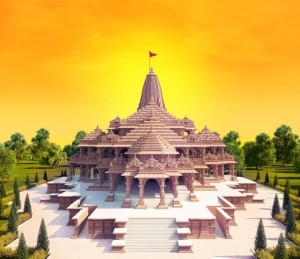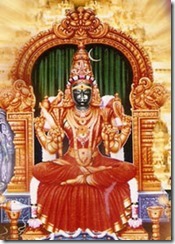नववर्षाभिनन्दनम्, புத்தாண்டு வாழ்த்துக்கள்! Ramanavami is just a few days away, so I convey my greetings for that occasion too! रामनवमी शुभाशयाः ! ராமநவமி வணக்கங்கள்! If you are lucky enough, perhaps you will get to hear a lot of live Carnatic Music at this time of the year. My ‘cultural’ immersion was last month.
March started with a concert by Sanjeev Abhyankar. I have adored his music ever since I chanced upon his videos some 10+ years back. So, it was very exciting for me to finally hear him live. Oh! What a wonderful, ecstatic experience it was! His voice is just out of the world! What mastery! Ah! I floated in a little cloud of perfect music for the few days following. It’s quite impossible to convey one’s experience of music or art to someone else, is it not? My experiences are a result of multiple factors – the acuity of my senses (or lack thereof), cultural heritage, understanding of the music, past experiences, frame of mind and so on. Sadly, music to my ears, finally, is music particular only to my ears. Yet, here I am, somehow trying to share my experience with you all!
Back to March, I also had the pleasure of listening to a series of lectures by the very popular Dushyant Sridhar – seven days on Srimad Bhagavatam. His knowledge is impressive, as is his memory. He has excellent presentation skills; the discourses are peppered with touches of humour and music too. It is easy listening and quite entertaining. Did I come away with a lot of new information? I don’t think so. The subject is a familiar one as I have heard a few Bhagavata Saptahams online. But I genuinely enjoyed rushing off every evening to listen to him. What I didn’t enjoy is seeing the rising pile of saris waiting to be ironed in my cupboard! Fellow NRI ladies will appreciate my pain….
Then it was தலைவர் Sanjay Subrahmanyan’s concert which was quite wonderful! He has such stage presence! It has been many years since I heard him live. I think his voice sounds the best it has ever been. His knowledge and skills are, of course, quite amazing. My heart and soul were musically replete by the end of the concert.
With this happy state of my heart, I have chosen a kriti for you in which Tyagaraja explains exactly what I feel! Inta Saukhyamani in Raga Kapi gives such saukhyam! It is also my small comment on the furore currently raging in Carnatic Music circles. Tyagaraja says that – I paraphrase it here – Very few can relish the great, indescribable bliss which is the sweetness of Rama Nama mixed in with the nectar of music. Note – it clearly states how music is mixed in with devotion! I have been examining CM lyrics since I started this blog in January 2011. It is undisputably evident Carnatic Music is, in essence, Hindu devotional music. As a theist spiritual seeker, I consider listening to this music to be just as much of an act of devotion as going to a temple or performing puja. There is a ‘Places of Worship Act’ in India, so as to prohibit conversion of any place of worship and to maintain the religious character as it existed on the 15th August, 1947. Please, can we have a ‘Music of Worship Act’ too so as to stop the cultural misappropriation which seems to be happening here?
To present this music, I have chosen a rendition by P.Unnikrishnan whose soft and gentle voice is particularly suited to the gentility of Kapi, I think. I must say that most of the 10+ renditions I have listened to in the past few days were all good. There is something quite beautiful about this composition. I confess, I do have a tendency to listen to my favourite artists repeatedly (I heard 3 versions by KVN, my current addiction – do listen to him too. I should try and find one from the 1960’s, when he was younger.).
Footnote: Lyrics and Translation
Composer: Tyagaraja
Raga: Kapi
Language: Telugu
Note- I do not speak Telugu; I have used various online resources for the lyrics and translation, in particlar the site Thyagaraja Vaibhavam.
Transliteration in Devanagari
पल्लवि
इन्त सौख्यमनि ने जॆप्प जाल
ऎन्तो एमो ऎवरिकि तॆलुसुनो
अनुपल्लवि
दान्त सीता कान्त करुणा
स्वान्त प्रेमादुलके तॆलुसुनु कानि
चरणम्
स्वर राग लय सुधा रसमन्दु
वर राम नाममने कण्ड चक्कॆर –
मिश्रमु जेसि भुजिञ्चे
शंकरुनिकि तॆलुसुनु त्यागराज विनुत
Transliteration in English
pallavi
inta saukhyamani nE jeppa jAla
entO EmO evariki telusunO
anupallavi
dAnta sItA kAnta karuNA-
svAnta prEmAdulakE telusunu kAni
charaNam
svara rAga laya sudhA rasamandu
vara rAma nAmamanE kaNDa-
chakkera mishramu jEsi bhujinchE
shankaruniki telusunu tyAgarAja vinuta
Translation
pallavi
So great (inta) is this bliss/happiness (saukhyamu) that I (nE) an unable (jAla) to express it (jeppa)! Who (evariki) knows (telusunO) what (EmO) and how great (entO) it is?
anupallavi
The bliss/happiness (implied from pallavi) is known (telusunu) only to those (AdulakE) self-restrained people (dAnta) having innate (svAnta) compassion (karuNA) and love (prEma) for the spouse (kAnta) of sItA (=Lord Rama), otherwise (kAni) who knows what and how great it is? (from pallavi)
charaNam
That bliss/happiness (implied) is known (telusunu) by Lord Shiva (shankaruniki) who consumes/enjoys (bhujinchE) the sugar-candy (kaNDa chakkera) called (anE) the supreme/precious (vara) name of Rama (rAma nAma) after mixing (mishramu jEsi) in (andu) the nectarine (sudhA) essence (rasa) of music (implied) made of notes (svara), melodic framework (rAga) and rhythm (laya).
I also quote the following translation from ‘Lines of Devotion’ by A.V.S.Sarma Pulished in 1954
What Happy Ecstasies are enjoyed by those
Who chant the name of Rama nectar-like!
All those that conquer self and love the Lord,
Sita, and the great Siva, who combines sweet
Ambrosia of Swara, Raga, Laya
With Candy sugar of the name of Ram!
Notation is available here: http://www.shivkumar.org/music/intasaukhyamani-kapi.pdf





 Yesterday I listened to two concerts on YouTube. Now this is a more momentous occasion than the statement reflects. I don’t often get time to listen non-stop to music so this was special. As usual my life feels like a runaway train with me hanging by my fingernails! But I’ll leave my life be for the moment. As I said, I was listening to concerts of two young men whose music I enjoy. Both have excellent gurus. Both have glorious voices, a remarkable stage presence and styles which have the mark of their guru on them. Actually, I find myself listening more and more often to young artists nowadays. I enjoy their energy and verve, and if they stumble now and then, they have a lifetime to fix it so I don’t worry about it.
Yesterday I listened to two concerts on YouTube. Now this is a more momentous occasion than the statement reflects. I don’t often get time to listen non-stop to music so this was special. As usual my life feels like a runaway train with me hanging by my fingernails! But I’ll leave my life be for the moment. As I said, I was listening to concerts of two young men whose music I enjoy. Both have excellent gurus. Both have glorious voices, a remarkable stage presence and styles which have the mark of their guru on them. Actually, I find myself listening more and more often to young artists nowadays. I enjoy their energy and verve, and if they stumble now and then, they have a lifetime to fix it so I don’t worry about it. A Happy New Year to all those who celebrate it today! I wish you the very best for a year of personal, professional and spiritual achievement!
A Happy New Year to all those who celebrate it today! I wish you the very best for a year of personal, professional and spiritual achievement! Have you ever thought about how so many different cultures use music as a form of worship? We all know of the wonderful choral music traditions of the Christians, the chantings of the Buddhists, the kirtans of the Sikhs, the emotional outpourings of the Sufis and the many traditions of musical worship of the Hindus. Some are simply sacred music, like bhajans, their primary purpose being worship. Others, like Carnatic Music, have a deep thread of devotion running through them but retain an identity apart from their devotional roots. So yes, the use of music as a means of worship is common enough. But it is not very common to have music itself as the divinity being worshipped. That is the concept which I approach in my post today.
Have you ever thought about how so many different cultures use music as a form of worship? We all know of the wonderful choral music traditions of the Christians, the chantings of the Buddhists, the kirtans of the Sikhs, the emotional outpourings of the Sufis and the many traditions of musical worship of the Hindus. Some are simply sacred music, like bhajans, their primary purpose being worship. Others, like Carnatic Music, have a deep thread of devotion running through them but retain an identity apart from their devotional roots. So yes, the use of music as a means of worship is common enough. But it is not very common to have music itself as the divinity being worshipped. That is the concept which I approach in my post today.

